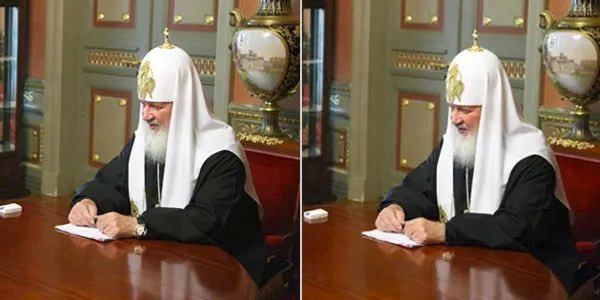In today's #vatnik soup I'll introduce a KGB agent and a billionaire who disguises himself as a holy man.His name is Vladimir Mikhailovich Gundyayev,but he's better known as Patriarch Kirill. Gundyayev is a close ally of Putin and he has called Putin's rule a "miracle of god" 1/8 

Historian Felix Corley published a study titled "The Mikhailov Files: Patriarch Kirill and the KGB" in 2018. This document revealed that in his past life Gundyayev was actually a KGB agent: academia.edu/37152767/The_M…
2/8
2/8
Gundyayev, who has often said that religious people should live a modest life, is also a billionaire - his fortune is estimated to be around 4 billion USD. He owns a yacht and several luxurious real estates around Russia.
3/8
3/8

He likes to spend his vacations in a palace in
Gelendzhik. This place is estimated to be worth around 250 million EUR. Vladimir is also not too keen on nature preservation: during the construction several acres of forest, including a rare species of pine, was logged.
4/8
Gelendzhik. This place is estimated to be worth around 250 million EUR. Vladimir is also not too keen on nature preservation: during the construction several acres of forest, including a rare species of pine, was logged.
4/8

How did Gundyayev get so rich? Through corruption, of course. His church was given a privilege for duty-free importation of cigarettes in the 90s. The Orthodox church became the largest supplier of foreign cigarettes in Russia: digitalcommons.georgefox.edu/ree/vol20/iss6…
5/8
5/8
In 2012 🇷🇺 state media photoshopped an image of Gundyayev wearing a 30000USD wristwatch but forgot to remove the watch from the reflection on a table. He stated that the device was edited on his hand, but later admitted that he actually owned this particular Breguet watch. 6/8 

Gundyayev has weaponized religion effectively. He sees gay pride parades as a one reason behind the Russia's invasion of Ukraine and has called the war "metaphysical". Gundyayev parrots Putin's talking points about Ukraine... 7/8
... including stories such as "8 years of genocide in Donbass", "neo-nazis in Ukraine" and that "dying for your country brings you to heaven".
He was sanctioned by the EU states in May, 2022, but was later removed from this list due to Hungary's intervention.
8/8
He was sanctioned by the EU states in May, 2022, but was later removed from this list due to Hungary's intervention.
8/8

• • •
Missing some Tweet in this thread? You can try to
force a refresh

































